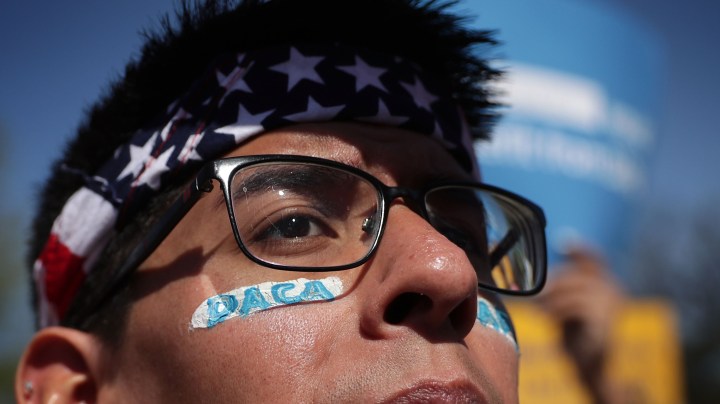Arizona Court Takes Away In-State Tuition for DACA Students, Leaving Many Futures Up in the Air

Pro-immigration activist Omar Martinez attends a rally in front of the U.S. Supreme Court April 18, 2016 in Washington, DC. Photo by Alex Wong/Getty Images
Two years after a judge ruled that Deferred Action for Childhood Arrival (DACA) recipients – that is, young undocumented immigrants who arrived to the country at a young age – could receive in-state tuition, the Arizona Court of Appeals overturned the decision. According to NBC News, the 2015 ruling stated that because the students lived in the US with documentation, they were eligible for state benefits. But, in his opinion, Appeals Court Judge Kenton Jones wrote that despite DACA recipients’ “positive societal attributes, Congress has not defined them … as ‘qualified aliens’ who are ‘lawfully present’ and thereby eligible to receive in-state tuition benefits.”
Citing the Personal Responsibility and Work Opportunity Reconciliation Act, Illegal Immigration Reform and Immigrant Responsibility Act, and Prop 300, Jones explained why the court couldn’t grant students in-state tuition. For the undocumented community, tuition can often present an obstacle in their journey toward higher education. With the 2015 ruling granting DACA students in-state tuition only standing for two years, it means that many plans may be derailed.
In both community colleges and four-year universities, the difference between in-state and out-of-state tuition is vast, according to the Associated Press. At one Arizona community college, for example, residents of the state pay $2,580 a year. Out-of-state tuition, however, is an additional $6,320. At one state university, in-state tuition comes in at $12,000 a year and out-of-state tuition costs $34,000 a year.
So when the 2015 ruling came in, some – like 23-year-old Belen Sisa – decided to make the jump from community college to four-year universities. The reversal will hurt Sisa – who will go into her senior year at Arizona State University in the fall. “I’m so close to the finish line,” she said. “I waited so long to get to graduation day, and it’s disappointing to see Arizona waste taxpayers’ money on lawsuits that attack DACA recipients who just want to get an education.”
Sisa – who went viral earlier in the year for posting a video herself to prove that undocumented immigrants pay taxes – has lived in the United States since age 6. She moved from Argentina and didn’t grow up imagining she could attend a university. Now she vows to fight, so that she can walk away with her degree. “I can’t let this stop me,” she said. “I’m so close to give up now.”
There are almost 28,000 DACA recipients living in Arizona, so Tuesday’s decision can have far-reaching effects. Arizona Attorney General Mark Brnobich – who brought forward the suit – says he feels sympathetic toward DACA students but that he’s merely “[preserving] the will of Arizona voters.”
However, for many, this decision marks a step backward. Oscar Hernández – a public policy major at Arizona State University – thought there was momentum building for the undocumented community. In 2014, the state gave DACA recipients permission to receive driver’s licenses. In 2015, they received in-state tuition. And in 2017, they’ve regressed.
“It reminds us of how vulnerable we are with DACA status,” Hernández said, according to AZ Central. “Now, we are sort of backtracking. It feels like with DACA, we were given the opportunity to truly reach for our American Dream, and now with all of these state policies and politics there are more hurdles now.”